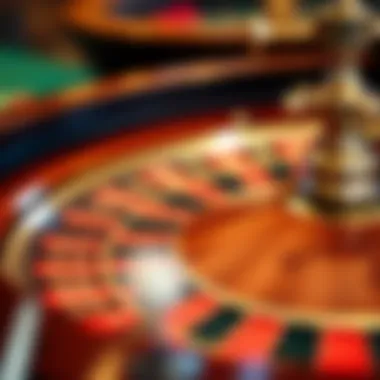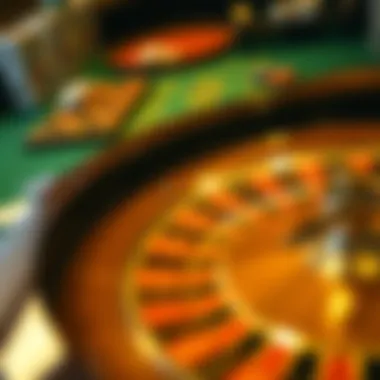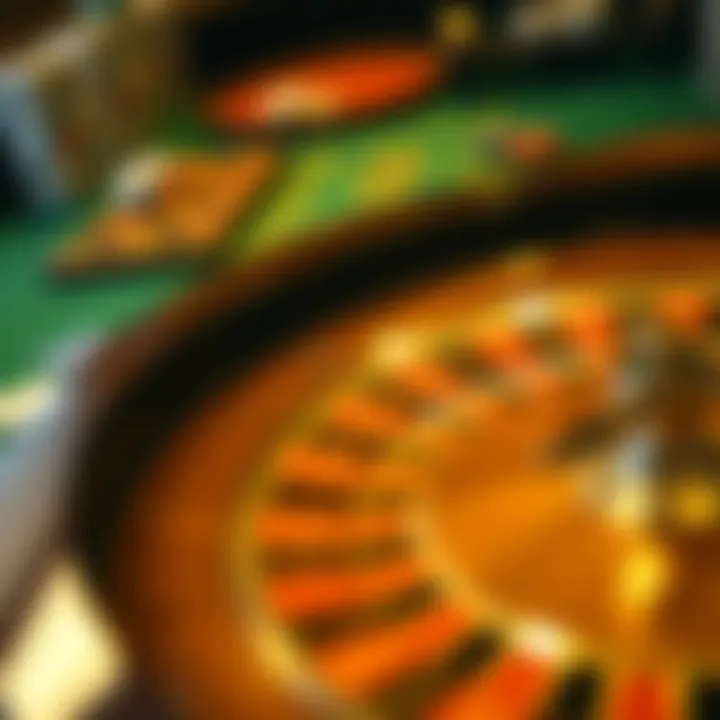Comprehensive Guide to the Roulette Table


Intro
The roulette table, a centerpiece of any casino, has fascinated gamblers for centuries. Whether you're a novice falling under its spell or a seasoned player honing your skills, the allure of the spinning wheel beckons all. This classic game, combining chance and strategy, provides not just entertainment but a glimpse into the rich tapestry of casino history. Here's where we get into the nuts and bolts of it all, focusing particularly on the various betting strategies that can navigate one’s journey through the colorful realm of roulette.
Rather than just lady luck playing the cards, many players analyze their options like chess masters contemplating their next moves. The intricate mechanics of flipping chips, deciding bets, and reading the table dynamics are vital aspects that could influence the odds in your favor. From figuring out the table layout to mastering the dos and don’ts of betting systems, we will unfold the layers that make this game much more than mere luck.
Let’s now plunge into the first and one of the most vital parts: betting strategies.
Historical Context of Roulette
Understanding the historical context of roulette provides a foundation for appreciating the game's depth and complexity. The origins, evolution, and cultural impact of roulette shape how players interact with the game today. By looking back to where roulette began, how it transformed over centuries, and its societal implications, one can gain valuable insights into the nuances that make this game so engaging.
Origins of the Game
Roulette, as we know it, traces its roots back to 17th-century France, but elements of the game can be seen even earlier than that. Records suggest that a similar game was played by the Romans, who utilized a spinning wheel to decide outcomes in terms of chance. The name "roulette" itself comes from the French word meaning "little wheel." This speaks to the formalization of the gaming experience and the development of what would become a staple in casinos worldwide.
The fundamental principles of modern roulette may have been grounded in European gambling traditions, yet it was in Paris where the game found its flair. Players were enchanted by the allure of betting on the spin of a wheel, combining luck with the thrill of anticipation. Early adoption across the continent set the stage for its widespread fame, indicating that roulette was not merely a game of luck, but also a social event bringing people together in joyful camaraderie.
Evolution over Centuries
Over time, roulette underwent various transformations that refined and redefined the game. The 19th century marked significant advancements, particularly with the introduction of the single zero in the European version, which was more favorable to players compared to the double zero present in American roulette. This change not only increased player interest but also affected the odds and the house edge, making European roulette a preferred choice among many gamblers.
As casinos proliferated in the 20th century, roulette became synonymous with the glitz and glamour of gambling culture. From the extravagant casinos on the French Riviera to the expansive resorts in Las Vegas, roulette tables became a central feature of gaming establishments. This evolution illustrates not only the game's enduring popularity but also its capacity to adapt to the changing landscape of casino entertainment.
Cultural Impact of Roulette
The impact of roulette extends beyond the confines of gambling tables; it has woven itself into the fabric of popular culture. References to roulette can be found in literature, film, and art, symbolizing chance, risk, and the unpredictability of life itself. Numerous films, such as "Casino Royale," feature the game prominently, amplifying its reputation as a cornerstone of high-stakes gambling.
Additionally, roulette has become a metaphor for choices and consequences in life. The idea that one spin could bring fortune or ruin captures the essence of risk-taking in various aspects of life, making it a cultural icon that resonates with both gamblers and non-gamblers alike. This widespread influence emphasizes roulette's significance not merely as a game, but as a representation of human experiences surrounding chance and decision-making.
"Roulette is not just a game of chance; it embodies the excitement of risking and the hope of reward."
In summary, exploring the historical context of roulette enables us to appreciate its transformation, from its obscure beginnings to a prominent place in modern culture. The game does not exist in isolation; rather, it serves as a reflection of societal values and idiosyncrasies surrounding chance and fortune. As we navigate the intricacies of the roulette table, understanding its past enriches the gaming experience, paving the way for deeper engagement with the game.
Understanding the Roulette Table Layout
Understanding the layout of a roulette table is vital for anyone venturing into this captivating game. The table is not just a playing field but a complex arrangement that affects the flow of the game and the strategies players might employ. Knowing the components of the table will help players make informed decisions about where to place their bets and what kinds of risks they are willing to take.
The layout aids in comprehending the various bet types and their associated odds. A clear grasp of how the table operates can enhance the overall game experience, allowing players to feel more in control and less like they are relying on sheer luck alone. Moreover, different versions of roulette come with varied layouts, each offering unique betting opportunities. This subtler understanding can make all the difference when trying to refine one's approach.
Components of the Table
At a glance, the roulette table may seem overwhelming, but it’s comprised of several specific elements that each hold importance. The key components include:
- The Wheel: This is where the magic happens. The roulette wheel has pockets numbered from 0 to 36 in European style and an additional 00 in American roulette.
- Betting Area: This section is marked with numbers corresponding to the wheel's pockets, along with various sections for different types of bets.
- Chips: These represent the player's bets. Each player typically uses unique colored chips to avoid confusion.
- Dealer: The one responsible for spinning the wheel, managing bets, and facilitating the game.
- Payout Table: This shows how much a player can win based on different types of bets.
Understanding these components is essential for a smooth gaming experience. When players know what each part does, they can participate with greater confidence.
Types of Roulette Tables
Roulette is not a one-size-fits-all game; there are several types of tables, each with unique rules and odds. Familiarizing oneself with these various styles can enrich the player's strategy and enjoyment. The primary types of roulette tables include American Roulette, European Roulette, and French Roulette.
American Roulette
American Roulette stands out primarily for its wheel layout, which features both single (0) and double (00) zeros. This key characteristic contributes to the house edge being slightly higher compared to its European counterpart, at 5.26%. For many players, this can be a disadvantage, but some enjoy the added thrill that this version brings.


A distinct feature of American Roulette is that players can often find a wider variety of betting options within the same game. This can be appealing to those looking to diversify their strategy. However, one should be cautious because the double zero pocket increases randomness, making it a bit trickier to predict outcomes.
European Roulette
European Roulette is generally favored by seasoned players due to its lower house edge of around 2.7%. This is primarily because it has only one zero on the wheel, which shifts the odds in favor of players. The simplicity of this version, combined with its favorable odds, makes it a popular choice for gamblers.
An eye-catching feature of European Roulette is the
Rules of the Game
Understanding the rules of roulette is crucial for anyone looking to engage deeply with this popular casino game. It's not just about placing bets and hoping for luck; comprehending the game's structure and regulations can significantly enhance your play experience. This section serves as the backbone of the roulette game, outlining important elements that every player must know. Familiarity with these rules helps in making informed betting decisions, which ultimately contributes to better gaming strategies and an elevated enjoyment of the game itself.
How to Play Roulette
Playing roulette is a relatively straightforward process, but the intricacies of the bets and their outcomes add layers of complexity. At its core, a round of roulette begins with players placing their bets on the table while the dealer, known as the croupier, spins the wheel. Once betting is closed, the croupier releases a small ball into the spinning wheel. The ball's fate is sealed as it bounces around the wheel's pockets before finally settling into one of them.
Players can either bet on a specific number, a range of numbers, or categories such as colors (red or black) or odds (odd or even).
Here are the steps involved in a typical game:
- Croupier opens the betting session by announcing, "Place your bets!"
- Players place their chips on the desired betting slots on the table.
- The croupier spins the wheel and releases the ball.
- Once the ball lands, the croupier announces the winning number and collects losing bets while paying out winning ones.
The key takeaway here is that roulette is as much about strategy as it is about chance. Knowing the rules provides the foundation for wise betting choices.
Types of Bets Available
Roulette offers a variety of betting options, each with unique characteristics that can be better suited to different player styles and objectives. Understanding these bets not only broadens your strategy but also gives you the flexibility to adapt to your comfort level regarding risk and reward. The three primary categories of bets are Inside Bets, Outside Bets, and Call Bets.
Inside Bets
Inside Bets refer to wagers placed directly on the numbered part of the roulette table. This category includes bets on single numbers, pairs, or small groups of numbers. What makes Inside Bets attractive is their potential for higher payouts, as the odds are lower. For instance, betting on a single number can result in a payout of 35 to 1. However, it’s worth mentioning that the risk factor is elevated here as landing on a specific number takes plenty of luck.
A unique feature of Inside Bets is their limited coverage, meaning that players might have a lesser chance of winning than with other bet types. Players who lean towards thrill might find these bets more appealing due to their excitement and the chance for a substantial profit.
Outside Bets
Outside Bets, on the other hand, are made on larger groupings of numbers or features like red/black or odd/even. These bets tend to be more favorable for players seeking consistency and smaller risks because they cover more possibilities. The trade-off here is that the payouts are smaller, typically around 1 to 1 on even-money bets.
A key trait is that Outside Bets provide a smoother experience for those who may be adverse to the high volatility of Inside Bets. This makes Outside Bets a popular choice among novices and cautious players looking to keep losses manageable while still enjoying the game.
Call Bets
Call Bets are somewhat different from both Inside and Outside Bets as they allow players to wager on a set of numbers based on the layout of the table. This can involve larger groupings or even specific sectors on the wheel, such as betting on a 'Voisins du Zero', which covers numbers close to zero.
Their defining characteristic is the social aspect; they are often made verbally and can sometimes create a bit of camaraderie at the table. While Call Bets can cover a wide range of numbers, thus increasing the chances of winning, the payouts can vary greatly depending on the specific bet placed.
Understanding the rules and betting strategies can lead to a more enjoyable and potentially profitable roulette experience.
For further reading, resources like Wikipedia, Britannica, and gaming communities on Reddit offer additional insights into the world of roulette.
Strategies for Successful Play
Understanding the strategies involved in roulette can make a significant difference in your overall experience at the table. Players often believe that luck is the sole factor determining outcomes in this game. However, having a solid strategy allows players to manage their bets more intelligently and helps prolong their gameplay. It’s all about making informed decisions and knowing when to take risks and when to step back, thereby maximizing enjoyment and potential profit.
Understanding Odds and Payouts


To appreciate any betting strategy fully, players have to understand the odds and payouts associated with the different bets on the table. In roulette, odds vary considerably depending on the type of bet. For example, a straight-up bet on a single number offers a payout of 35 to 1 but comes with much lower odds of winning, roughly 2.63% in European roulette.
On the opposite end of the spectrum, even money bets such as red or black have much better odds, sitting around 48.6% on a European wheel but only garner a payout of 1 to 1. Understanding this simple rule can guide players in choosing their bets wisely and help them gauge how much risk they’re willing to take with their bankroll.
Popular Betting Strategies
When it comes to putting your money down, the methods players adopt can really change the game. Here are a few strategies that have garnered attention over time:
Martingale Strategy
The Martingale Strategy operates on a straightforward principle: if you lose, you double your bet on the next wager. This approach can seem attractive because, theoretically, it ensures that you will recover all previous losses once you finally win. Many players find it appealing for its immediacy and simplicity.
However, there's a catch. This strategy requires a substantial bankroll. If you hit a losing streak, you could end up needing a huge amount to keep betting. Plus, casinos often impose table limits, which can prevent you from continuing to double your stakes after a certain point. So while it can be beneficial for short-term play, it's essential to tread carefully.
'Alembert System
The D'Alembert System offers a more moderate take on betting strategies. You increase your bet by one unit after a loss and decrease it by one unit after a win. This system is focused on balancing potential losses with gains, providing a sense of control that can be appealing to many players. It's popular because it's less aggressive compared to some other systems, making it easier on one's wallet in practice.
Still, keep in mind that no betting system can overcome the house edge in roulette. While it smooths out variance in the short term, it doesn't guarantee sustained profitability in the long run.
Fibonacci Approach
This strategy is based on the famous Fibonacci sequence, where each number is the sum of the two preceding ones. In practice, you place bets according to this sequence after losing, supposed to recover your losses gradually. Players like this system because it’s methodical and gives a sense of direction during gameplay.
Even so, there are trade-offs. Just like other strategies, it does not eliminate the inherent risks of the game. And because the bets can get quite high after a losing streak, it can be a risky endeavor if not managed well.
Managing Your Bankroll
Being able to manage your bankroll effectively is perhaps the most crucial aspect of any roulette strategy. Set a strict budget before you sit down at the table and stick to it. This way, you limit how much you're willing to lose and ensure you don’t end up throwing good money after bad.
Also, consider implementing limit betting: deciding in advance when to increase or decrease your bets based on your current bankroll. This method not only saves money but helps maintain a level of discipline that’s essential for longer sessions.
It’s not just about winning; it’s essential to enjoy the experience. Casino games, including roulette, should be entertaining rather than a source of stress. Having clear strategies and maintaining control over your bets is the way to ensure that all involved brings about greater enjoyment and possibly, profits.
Psychological Aspects of Roulette
The psychology of the roulette table is a fascinating realm where numbers, chance, and human behavior collide. Understanding the psychological aspects of roulette not only enhances one's gameplay but can also be critical in managing expectations and emotions. In any casino setting, luck plays a prominent role, but players often bring their own mindset and emotional baggage to the table. This section unpacks how psychological factors influence both the enjoyment and outcomes of the game.
The Role of Luck versus Skill
When it comes to roulette, many players debate whether triumph is forged through luck or whether a calculated skill can sway the odds, even if only slightly. On the surface, the game might appear fundamentally driven by chance; after all, the ball tumbles across the wheel and landing on a number seems utterly random. However, certain skills do come into play, such as making informed decisions about bets or understanding the odds associated with various betting options.
Yet, even the most skillful bets can’t guarantee a win. This duality of luck and skill grips the minds of players—they navigate between the thrill of reliance on fate and their ability to influence the tide. The difficulty lies in accepting that despite all skillful maneuvers, luck remains a fickle friend. Thus, successful players often learn to adapt their strategies not only to the mechanics of betting but to their emotional responses as well.
Common Player Mindsets
Understanding the psychological nuances of gambling involves recognizing diverse player mindsets, two of which stand out in roulette—Chasing Losses and Overconfidence. Each mindset showcases how players navigate emotional highs and lows during their gameplay.
Chasing Losses
Chasing losses is a prevalent mindset among gamblers, particularly those who have experienced losing streaks at the roulette table. This notion revolves around the belief that one can recoup their losses by placing larger bets, often leading to a cycle of gambling that can spiral out of control.
Key characteristic of this mindset is the emotionally driven desire for recovery, which can blind players to rational decision-making. In the moment, players might feel that the odds have shifted in their favor due to the perceived need to “make it right.” While the urge to chase can spur a burst of thrill, it carries considerable risk, often resulting in even deeper financial loss. The challenge is how to recognize when to step back—a crucial aspect covered in this article.
"Chasing losses can lead to a betting frenzy that clouds judgment—manage your emotional responses to maintain control over your gameplay."


Overconfidence
Overconfidence is another potent mindset that affects roulette players' decision-making. This mindset occurs when players feel invulnerable after a series of wins, luring them into believing they have a winning formula or some level of control over chance. It is the sensation of being on a “lucky streak” that can induce players to place risks without proper consideration.
This mindset also hinges heavily on cognitive biases, where the player might overlook previous losses or failures. The unique feature of overconfidence in roulette is how quickly fortunes can shift, and a series of victories can lead to unrealistic expectations. While confidence can fuel exciting gameplay, not balancing it with analytical thought can yield devastating consequences when luck decides not to play along.
The Future of Roulette
As we gaze into the crystal ball of roulette, it becomes clear that the game is on the cusp of tremendous transformation. Several elements highlight how roulette, a game steeped in tradition, is embracing modernity, making it a captivating subject for both seasoned players and newcomers alike.
Technological Advancements in Gambling
The realm of gambling technology has taken quantum leaps. Roulette is no exception. Among the most notable advancements are the introduction of sophisticated software and hardware designed to improve the player experience. For instance, the use of random number generators (RNG) in online settings ensures fairness and randomness—key components in establishing trust with players.
Moreover, the emergence of virtual reality (VR) has begun to carve its niche as well. Imagine experiencing a roulette table from the comfort of your living room, surrounded by the glitz and glam of a real casino environment. This tech not only engages users but also allows for social interactions in a way that traditional online platforms simply can't replicate. VR's immersive element may just end up revolutionizing how we approach not just roulette, but gambling as a whole.
- Mobile Gambling: With the increasing dominance of smartphones, mobile roulette applications are sprouting up like daisies in spring. They offer flexibility and ease, empowering players to spin and bet wherever they desire.
- Live Dealer Games: Casinos have taken a giant leap forward by offering live dealer roulette, allowing players to interact with a real dealer streamed directly to their screens. This adds a personal touch, keeping the thrill alive.
These advancements not only enhance gameplay but also cater to the shifting preferences of players. IF this trend continues, we might soon find ourselves in a landscape where roulette operates on multiple levels—online, offline, virtual, and perhaps beyond.
Online Roulette Trends
The online component of roulette has established a foothold that shows no signs of retreating. The landscape of online roulette is thriving with several noteworthy trends that are reshaping how players view this age-old game.
- Game Variety: Numerous online platforms now offer a plethora of roulette variants, from American and European to novel formats tailored to contemporary tastes. These variations often come with unique rulesets and betting options, providing players with an expansive range of choices.
- Bonuses and Promotions: Online casinos are known for their attractive bonuses. Many offer welcome bonuses, no-deposit bonuses, or cash back on losses. These offers entice players to explore more, enhancing player retention while creating a richer experience.
- Cryptocurrency Integration: With digital currencies like Bitcoin becoming commonplace, some online roulette platforms have begun accepting cryptocurrencies. This not only appeals to tech-savvy gamblers but may also introduce a layer of anonymity and security that traditional banking methods cannot provide.
"Every spin brings a blend of luck, skill, and anticipation, and how players engage with this classic game is evolving rapidly."
For those who wish to stay in-the-know, exploring resources like Wikipedia or articles on Britannica can provide further insights. Additionally, communities on Reddit offer real-time discussions and tips from experienced players.
Ending
The conclusion of this exploration of the roulette table serves as a culmination of the insights and knowledge shared throughout the article. It’s not just a wrap-up; it highlights the significance of understanding both the nuances of the game and the broader context within which it exists. Roulette isn’t merely about chance; it’s a fusion of history, strategy, psychology, and technology.
By dissecting the various elements presented, readers can appreciate that this game has evolved into much more than just spinning a wheel and placing bets. The historical context enriches our understanding, while the breakdown of the table layout provides clarity. Furthermore, grasping the rules and strategies equips players to approach the game with informed choices.
Here’s what the discussion reveals:
- Knowing the components of the table aids in navigation and gameplay.
- Understanding different types of bets facilitates strategic betting, enhancing the chances of favorable outcomes.
- Recognizing psychological factors helps players manage mindset, reducing pitfalls like chasing losses or overconfidence.
- Awareness of technological advancements and trends shapes the future of how roulette is played – both in brick-and-mortar establishments and online.
As players take this information into their next game, they do so with knowledge that can significantly enhance their overall experience.
"Knowledge is power, especially when it comes to games of chance."
With this comprehensive look at roulette, individuals from all backgrounds, whether novices or seasoned pros, are better equipped. And so, the next time you approach that spinning wheel, you’ll do so with a deeper understanding and perhaps a bit more confidence.
Summary of Key Points
In recapitulating the essential aspects of this article:
- The historical origins and evolution of roulette offer a richer appreciation for the game.
- Familiarity with the table layout and components helps clarify gameplay.
- Understanding the rules and betting types opens avenues for strategic play.
- Engaging with various strategies can enhance decision-making and potentially lead to better outcomes.
- Awareness of the psychological facets of gambling helps maintain a healthy approach to gameplay.
- Keeping an eye on trends and technological advancements ensures players remain relevant and informed.
By reflecting on these key elements, players can solidify their understanding and approach to roulette, allowing for a more immersive and enjoyable gaming experience.
Further Reading and Resources
To continue exploring the fascinating world of roulette and gambling in general, consider the following resources:
- Wikipedia - Roulette
- Encyclopedia Britannica - Gambling
- Reddit - Roulette Strategies
- Gambling.gov (U.S. government resource on gambling regulations)
- Psychology Today - The Mind of a Gambler
These entries will deepen your understanding, expand your strategies, and capture the rich tapestry that is roulette and gaming as a whole. Make sure to engage with these sources for a rounded perspective.



